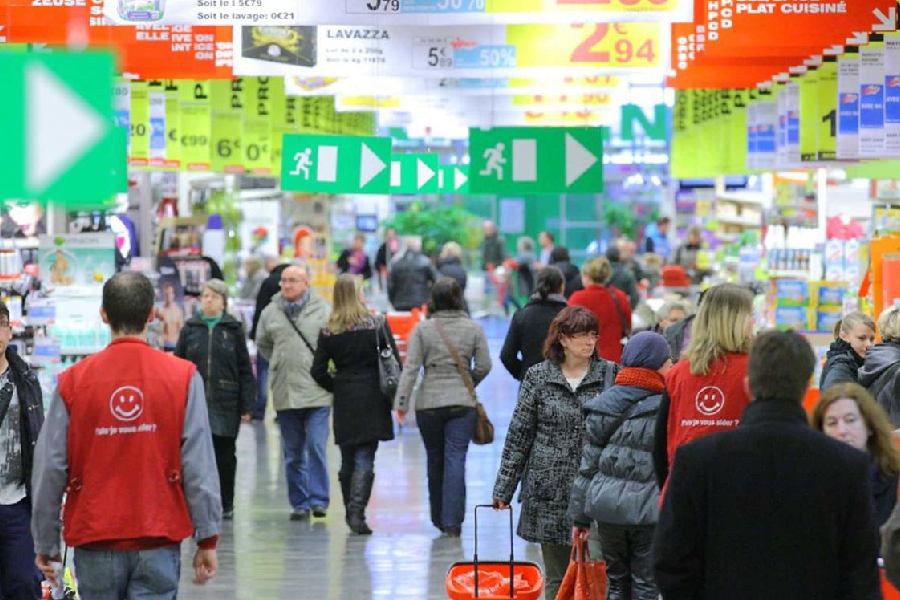Book: LOOK AT THE LIGHTS, MY LOVE
Author: Annie Ernaux
Published by: Yale
Price: $16
“Politicians, journalists, ‘experts’, all those who have never set foot in a superstore, do not know the social reality of France.” The Nobel laureate, Annie Ernaux, makes this unusual declaration in her newly translated book, Look at the Lights, My Love. Written as a contribution towards Pierre Rosanvallon and Pauline Peretz’s collection on the quotidian lives of everyday people (Raconter la vie/Write about life, 2014), Ernaux’s “superstore” journal is a fascinating read. Based on a year of shopping observations at Cergy’s Auchan, the giant French multinational retail group, the slim journal is replete with “impressionistic recording of things, people and atmosphere”. By inserting herself as an everyday shopper who visits the superstore to escape loneliness and to find entertainment besides doing her grocery shopping, Ernaux provides an ensemble of potent subtexts dealing with practices and people linked through commerce and commodities.
Keeping aside the initial discomfort that a reader might have with the author’s invisibility as an “anonymous customer”, Ernaux’s incisiveness is apparent in the ways in which she unveils the ideologies underlying consuming desires: in the gendering of toys, in the sidelining of the “everyday deals section”, in the segregation of “‘international’ aisles”, and in the starkness of conveyer belts which expose who and what we are. But seduction is encased in surveillance, in intimidatory signages and invisible cameras. Branded and logoed, the hypermodernity and vastness of Auchan are enhanced by its location: inside the sealed and monitored Cergy town centre, but directly accessible on foot from the train station and by car from the expressway.
Inside the superstore, memory is muted and history is banished such that a community of docile and disciplined consumers endlessly circulate within the ‘now’ of the shelves and aisles. Why don’t people revolt, Ernaux asks and promptly answers by saying that “we are a community of desires, not action”. Historically, French mass consumption originated in the early 1930s, in ‘cheap’ Parisian variety store chains, such as Prisunic. Subsequently, during the thirty-year boom period, les trente glorieuses, there was a burst of superstores in sync with the growing prosperity of the post-War French middle classes. However, like elsewhere, consumptive practices remain divided along class lines: while middle classes and working classes throng the superstores, the metropolitan elite looks down on “these so called non places”.
Ernaux powerfully punctuates this history of mass consumption by reminding us that giant retail stores live off cheap labour and are responsible for the degradation and the destruction of the lives of workers located in far-off countries. She draws attention to the deadly fire of 2013 that broke out in the textile factory in Bangladesh’s Rana Plaza, and how “in the rubble were brand labels for Carrefour, Camaïeu and Auchan”. Admittedly, Ernaux doesn’t push the argument of Auchan’s accountability to its logical conclusion, but the weaving in of the sordid history of exploitative labour practices is deft and deliberate.
Beyond exposing Auchan’s predatory chains, Ernaux’s concerns are with the social lives of shoppers residing in Cergy, her adopted hometown. Thirty kilometres from Paris, Cergy is a town that Ernaux describes elsewhere as a “place suddenly sprung up from nowhere, a place bereft of memories” (Exteriors, 1996). So, who are the shoppers who populate Auchan and fascinate Ernaux? Local newspapers inform her that “the Cergy region is home to 130 different nationalities”. Created out of diverse histories of colonisation, economic compulsions or humanitarian crises, Ernaux observes how these new communities are driven to the superstore by the same elemental needs of food, clothing and entertainment.
Today, race has been expunged from the French Constitution and officially one cannot collect data regarding race or ethnicity. Social reality, however, is otherwise. With its focus on shoppers, Ernaux’s journal highlights the gap between the colour-blind public policy aimed at political universalism and the social reality of marginalisation of people of colour. Paradoxically, while she is seized by the peculiar ‘French’ problem of identifying the ethnicity of shoppers and she wonders whether “black” is correct or “African” or “simply a woman”, mass merchandisers show no such inhibitions. Adapting itself “to the cultural diversity of its clientele”, the superstore reaps profits from “ethnic”, not ethical, marketing. Given the complexities, Ernaux does well to remind decision-makers to pay attention to the social reality of superstores.
Besides the sociological imperatives, Look at the Lights has another facet, a literary one. Since superstores assume infinite powers as a “great human meeting place, a spectacle”, one wonders why “superstores never appeared in the novels” and “how much time” will be “required for a new reality to achieve literary dignity”. Through the intimacy of the journal, a genre well-suited for the purpose, Ernaux says, “we could definitely write life narratives from the perspective of superstores visited on a regular basis”. Words of wisdom from the 2022 Nobel Laureate in Literature.











